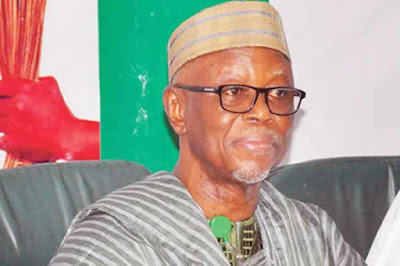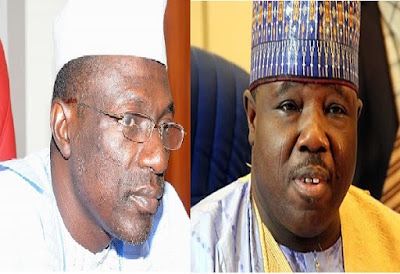In this piece, TOLUWANI ENIOLA examines the implications of the crises currently rocking the All Progressives Congress and the Peoples Democratic Party
Although 2019 is three years away, events in the country’s political landscape suggest that the All Progressives Congress and the Peoples Democratic Party are not leaving anything to chance in their quests for power. Both major parties, however, share a striking similarity as a series of crises seem to be tearing them apart.
While the PDP has failed to reach a consensus on the party’s authentic leadership, admirers of the APC are worried about the inability of the party to effectively manage its crisis, which has spilled to the state chapters, and protect the reputation it sold to millions of Nigerians during the 2015 general elections.
The APC faced its first litmus test in power dynamics earlier in the life of the 8th Assembly when the process of choosing the Senate President, Bukola Saraki, and Speaker of the House of Representatives, Yakubu Dogara, ended in bitter disagreement. The intrigues that played out during the election of the presiding officers of the National Assembly confirmed a speculation that all was not well with the ruling party despite attempts to make the public believe otherwise.
While the dust gradually settled, another crisis gradually crept in. This time, the lower legislative chamber was embroiled in a budget padding scandal. The cracks caused by this recent crisis are widening daily as the ruling party battles to put its house in order and salvage its plummeting reputation.
On July 21, Dogara, courted trouble when he sacked the Chairman, House Committee on Appropriation, Mr. Abdulmumin Jibrin, owing to the crisis which trailed the passage of the 2016 budget.
Jibrin, a frontline APC lawmaker from Kano State, was instantly replaced by another member from the state, Mr. Mustapha Bala-Dawaki. It was learnt that Dogara had been under pressure to remove Jibrin as the appropriation committee chairman since May when details of the 2016 budget caused division between Jibrin and other members of the House.
PDP crisis
Sen. Ahmed Makarfi and Modu Sheriff have been locked in a battle for control of the PDP
The embattled Dogara has become the victim of public outrage in the last two weeks when he declared that budget padding was not corruption. Dogara, after a closed-door meeting with President Muhammadu Buhari, had said that he would not resign as the Speaker over the allegations levelled against him and 12 others by Jibrin.
Critics of the party noted that the Speaker was merely echoing a gaffe made by former President Goodluck Jonathan that “stealing is not corruption.” Observers believe that Dogara’s claim confirms the view that members of both the APC and the PDP are birds of a feather.
For the PDP, these are not the best of times. The party is effortlessly trying to recover from its defeat in the 2015 general elections. The recovery plans are facing a setback with the ongoing leadership tussle between the Ahmed Makarfi-led caretaker committee and the Ali Modu Sheriff’s faction of the party. The protracted national leadership crisis has spilled over to Lagos, Ondo, Edo and other state chapters of the party.
In Edo and Ondo states, where governorship elections will hold before the end of the year, the PDP will produce at least two governorship candidates each in the states as a result of the factional crisis.
In Edo State, three aspirants contested the party’s ticket in the primary, which was organised by the Makarfi-led national caretaker committee in Benin. They included a former Secretary to the State Government, Osagie Ize-Iyamu; a former Majority Leader in the House of Assembly, Matthew Iduoriyekemwen, and the candidate of the All Nigeria Peoples Party in the 2012 governorship polls, Solomon Edebiri. Ize-Iyamu won the primary.
The pro-Sheriff primary later produced Iduoriyekemwen as the PDP governorship candidate.
In Ondo, the Makarfi-led faction has produced Mr. Eyitayo Jegede, the immediate past Attorney-General and Commissioner for Justice, as the party’s governorship candidate. He defeated Mr. Saka Lawal at the primary observed by officials of the Independent National Electoral Commission.
The pro-Sheriff faction on the other hand, parading big names like the business mogul, Mr. Jimoh Ibrahim and the immediate past Commissioner for the Environment in the state, Mr. Sola Ebiseni, would probably hold a separate primary this week.
While no political party is immune to crisis all over the world, the twist to this development is the failure of the major parties to resolve their crises.
A factional Chairman of the APC in Kano, Useni Mairiga, had described the President Muhammadu Buhari-led administration as a total failure. Mairiga’s statement also brought to the fore some unresolved internal crisis in the state chapters of the APC. For instance, in Ondo State, the APC has two factional publicity secretaries. The Ondo State APC has been embroiled in crisis since the removal of the state chairman of the party, Isaac Kekemeke, last week. In Bayelsa State, the factional crisis rocking the state chapter of the APC has yet to be fully settled. The Ogun State chapter of the party is also battling with factional crisis.
Attempts made by the leaders of the APC to reconcile Dogara and Jibrin have not been successful; neither has the party’s leaders been able to reconcile the crises in its state chapters. While the crisis is seen as a litmus test for the Chief John Odigie-Oyegun–led leadership of the APC, political watchers are worried about the silence of some major stakeholders of the party in condemning the alleged corruption by the top APC lawmakers in the House of Representatives.
The Deputy Secretary of the APC, Timi Frank, told SUNDAY PUNCH that the party’s leadership intervention on the budget padding crisis was belated.
He said, “Personally I have condemned my political party for keeping silent on the padding scandal by the members of the House of Representatives – when it was expected to do something. It should have intervened long before now. The party leaders should have done something when the matter had yet to become a public issue.
The National Leader of the APC, Asiwaju Bola Tinubu, two months ago, received commendations for slamming the Minister of Petroleum Resources, Ibe Kachikwu, for the latter’s perceived rude comments on the fuel scarcity crisis. But since the budget padding crisis involving Jibrin and Dogara started, no word has been heard from him.
Some believe that Tinubu and Odigie-Oyegun should have condemned Dogara and Jibrin and set up an internal mechanism to investigate the allegations, rather than the directive that Jibrin should keep quiet on the issue.
On the implications of the crises to the country’s democracy, a Second Republic member of the House of Representatives, Junaid Mohammed, said the APC had not demonstrated that it was different from the PDP in terms of ideology and commitment to the rule of law.
In an interview with our correspondent, he said, “I said shortly after the APC won the general elections that it was important that the party must demonstrate that it is different from the PDP. If it failed to do that, the party will be rejected by Nigerians.
“Since Buhari was sworn in till date, the APC has not demonstrated any clear difference in terms of ideology, commitment to the rule of law and running the party as a progressive party. If the APC thinks it can continue the way it is running the government, it is making a very serious mistake. Nigerians are fed up.”
Buttressing Mohammed’s point, a Professor of Political Science at the University of Abuja, Dauda Saleh, said the inability of the APC to discipline its members and condemn corrupt activities portended a bad omen for the country. Saleh said if something concrete was not done, the party might soon disintegrate.
“The party lacks internal cohesion and if care is not taken, the party will split into various groups that came together to form the APC unless they do something fast to ensure that members are treated fairly and justly and submit to the party’s supremacy. The party must be willing to sanction any erring members who violate its rules and directives,” he told SUNDAY PUNCH.”
Reacting to the PDP crisis in an interview with our correspondent, a former Minister of Works and a chieftain of the Peoples Democratic Party, Chief Adeseye Ogunlewe, warned that the PDP would not continue to have problems if internal democracy was not embraced.
The lawmaker representing Ojo Federal Constituency in the House of Representatives, Tajudeen Obasa, in his submissions, however, described the agitation by the various factions of the party as a victory for democracy, noting that democracy was all about uniting views of different positions.
The lawmaker, who was elected on the platform of the PDP, appealed to the founding fathers to do the needful by uniting all warring factions for the sole aim of reclaiming the presidential status in 2019.
“Sustaining the success of a political party lies in its internal mechanism to resolve issues as they arise. The PDP will surely bounce back to reclaim its presidential status in the next general elections. All agitations by various groups will be a joyful blessing for repositioning,” he told SUNDAY PUNCH.
Without doubt, the lingering crises have cast a pall of uncertainty over the future of the APC and the PDP. There is a poser for the major parties as they seek antidotes to their problems. Have they done the best to quell the wrangling that seems to be tearing them apart? Will the parties survive these crises? Only time will tell.
PUNCH NG









